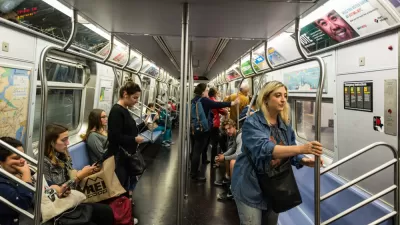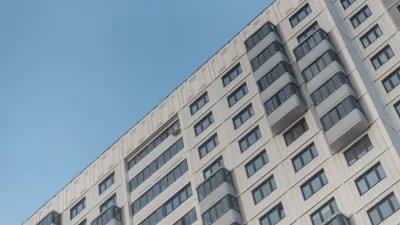Unlike its slowing economy, infrastructure projects across China continue to expand. Already home to three of the world's most-used transit systems, China plans to invest $127 billion in the coming decade to build dozens of new urban rail projects.
The Transport Politic's Yonah Freemark looks at the dramatic expansion of China's urban rapid-transit networks. Three Chinese cities now occupy the 4th, 5th, and 6th places for highest transit usage in the world (Guangzhou, Shanghai, and Beijing, respectively). In total, "[a]bout $127 billion (or 800 billion yuan) is to be directed over the next three to eight years to build 25 subways and elevated rail lines as a stimulus whose major benefit will be a increase in mobility for the rapidly urbanizing nation," says Freemark.
The Chinese government doesn't seem to be concerned with whether the new lines will ever be able to pay back their initial capital expenses or become operationally independent. Freemark opines on why this might be the case:
"It seems more likely that Chinese officials recognize that the metro investments, in addition to offering an important economic stimulus, provide positive externalities that outweigh the subsidies that will be required to maintain the systems. By setting fares low, the metro lines are able to attract higher ridership and passengers from across the income spectrum. Even in the densest, most-packed city centers, metro systems allow largely congestion-free mobility that is able to handle far more people and provide faster service than equivalent tramway or BRT programs."
"There is a reason these projects have proven so popular among China's citizens. The transportation benefits they offer certainly contribute to economic growth in the center of the cities they serve and likely limit the suburbanization of jobs."
Thanks to Andrew Gorden
FULL STORY: Profitable or Not, China Doubles Down on Investments in New Metro Systems

Maui's Vacation Rental Debate Turns Ugly
Verbal attacks, misinformation campaigns and fistfights plague a high-stakes debate to convert thousands of vacation rentals into long-term housing.

Planetizen Federal Action Tracker
A weekly monitor of how Trump’s orders and actions are impacting planners and planning in America.

San Francisco Suspends Traffic Calming Amidst Record Deaths
Citing “a challenging fiscal landscape,” the city will cease the program on the heels of 42 traffic deaths, including 24 pedestrians.

Defunct Pittsburgh Power Plant to Become Residential Tower
A decommissioned steam heat plant will be redeveloped into almost 100 affordable housing units.

Trump Prompts Restructuring of Transportation Research Board in “Unprecedented Overreach”
The TRB has eliminated more than half of its committees including those focused on climate, equity, and cities.

Amtrak Rolls Out New Orleans to Alabama “Mardi Gras” Train
The new service will operate morning and evening departures between Mobile and New Orleans.
Urban Design for Planners 1: Software Tools
This six-course series explores essential urban design concepts using open source software and equips planners with the tools they need to participate fully in the urban design process.
Planning for Universal Design
Learn the tools for implementing Universal Design in planning regulations.
Heyer Gruel & Associates PA
JM Goldson LLC
Custer County Colorado
City of Camden Redevelopment Agency
City of Astoria
Transportation Research & Education Center (TREC) at Portland State University
Jefferson Parish Government
Camden Redevelopment Agency
City of Claremont




























